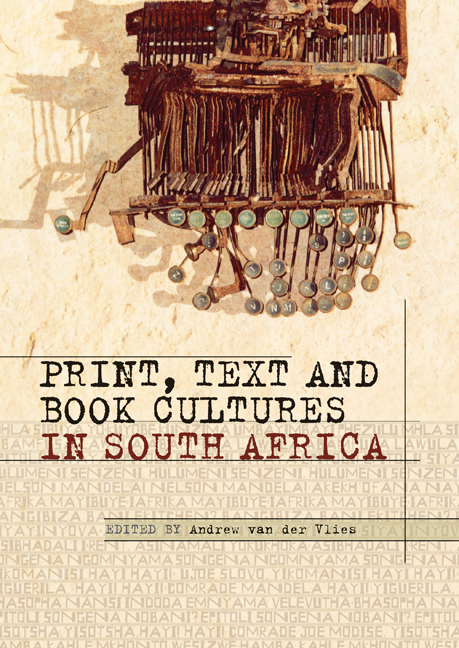Book contents
- Frontmatter
- Contents
- Acknowledgements
- Abbreviations and acronyms
- 1 Introductory
- 2 Print Cultures and Colonial Public Spheres
- 3 Local/Global: South African Writing and Global Imaginaries
- 4 Three Ways of Looking at Coetzee
- 4.1 In (or From) the Heart of the Country: Local and Global Lives of Coetzee's Anti-pastoral
- 4.2 Under Local Eyes: The South African Publishing Context of J. M. Coetzee's Foe
- 4.3 Limber: The Flexibilities of Post-Nobel Coetzee
- 5 Questions of the Archive and the Uses of Books
- 6 Orature, Image, Text
- 7 Ideological Exigencies and the Fates of Books
- 8 New Directions
- Contributors
- Index
4.2 Under Local Eyes: The South African Publishing Context of J. M. Coetzee's Foe
from 4 - Three Ways of Looking at Coetzee
Published online by Cambridge University Press: 21 April 2018
- Frontmatter
- Contents
- Acknowledgements
- Abbreviations and acronyms
- 1 Introductory
- 2 Print Cultures and Colonial Public Spheres
- 3 Local/Global: South African Writing and Global Imaginaries
- 4 Three Ways of Looking at Coetzee
- 4.1 In (or From) the Heart of the Country: Local and Global Lives of Coetzee's Anti-pastoral
- 4.2 Under Local Eyes: The South African Publishing Context of J. M. Coetzee's Foe
- 4.3 Limber: The Flexibilities of Post-Nobel Coetzee
- 5 Questions of the Archive and the Uses of Books
- 6 Orature, Image, Text
- 7 Ideological Exigencies and the Fates of Books
- 8 New Directions
- Contributors
- Index
Summary
“To me the moral is that he has the last word who disposes over the greatest force.”
Coetzee (1986a, 124)Publishing contexts affect and influence the reception and interpretation of literary texts. Recognising this, Andries Oliphant (2000, 107) describes book publishing as “perhaps the most powerful institutional apparatus in modern literary culture”. In order to explore further the impact of this institutional apparatus, as well as the value of methodologies that take it into account, I focus here on J. M. Coetzee's fifth novel, Foe, a particularly relevant text, given its concern with the cultural and institutional pressures that are brought to bear on the literary work at the time of its writing. It is this novel's publication and reception history that make clear the extent to which such pressures continue to operate long after the writing's completion.
As with Coetzee's previous three novels, Foe was published separately by Secker & Warburg in London and Ravan Press in Johannesburg. While its British publication ensured that Foe circulated in and was read as engaging with a metropolitan literary field, its South African edition positioned the novel within a quite different, local literary milieu. As various institutional pressures have been exerted on the novel's reception, however, its interactions with this local milieu have come to be disregarded and the novel largely read in relation to its metropolitan contexts. Ultimately, this inattention to Foe's relationship with the South African literary field has prevented the novel from “saying” certain things and limited its significance to a broad, theoretical concern with cultural production and the position of the sexual and racial “other”.
RAVAN PRESS, STAFFRIDER AND FOE's SOUTH AFRICAN CONTEXT
When Foe first appeared in 1986 as both a Ravan and Secker & Warburg publication, there was very little to distinguish its two editions; apart from the publisher's imprint, they were, in fact, physically identical. In each case, the cover's design consisted of a close-up photograph of wet beach-sand in which the word “FOE” had been inscribed, while on the inner cover each edition made use of the same author's photograph, the same biography and the same blurb.
- Type
- Chapter
- Information
- Print, Text and Book Cultures in South Africa , pp. 195 - 207Publisher: Wits University PressPrint publication year: 2012



